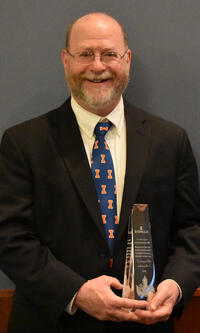"My BS in Math/CS at UIUC is the foundation for all of my professional accomplishments. It is where I learned the fundamentals of computation and symbolic representation. Now, even more than when I was a student, the UIUC Math/CS education is ideal for a research career in the health sciences."
Howard Aizenstein received his bachelor’s degree in mathematics in 1986. His masters and PhD degrees in Computer Science and MD degree are also from the University of Illinois. An internationally recognized expert in computational neuroscience, Dr. Aizenstein has made significant contributions to the analysis of neuroimaging data and to the translation of this research to improve the lives of individuals with cognitive impairment and depression.
Dr. Aizenstein holds the Charles F. Reynolds III and Ellen G. Detlefsen Endowed Chair in Geriatric Psychiatry at the University of Pittsburgh, where he is also Professor of Bioengineering and Clinical and Translational Science as well as the founder and director of the Geriatric Psychiatry Neuroimaging Laboratory. He also cares for elderly patients at the Alzheimer's Disease Research Center as well as the UPMC Benedum Geriatric Center inpatient unit, where he also supervises residents.
Depression in the elderly is a leading cause of lost years of healthy life and a major public health concern. As a physician-scientist, Dr. Aizenstein's research has substantially increased our understanding of the neural mechanisms associated with geriatric depression and has improved prevention and treatment. He has used his training in computational science to identify the neural pathways involved in implicit and explicit learning using both structural and functional MRI, and he has developed new computational methods which continue to advance the field of neuroimaging research.
Dr. Aizenstein's contributions as a skilled educator, as a thoughtful mentor, and as a compassionate clinician are equally impressive. He serves as Director of a federally funded program for Clinical Research Training in Late-Life Mood Disorders. He has mentored numerous undergraduates, postdoctoral fellows, residents and junior faculty members who have gone onto successful careers. He developed and co-directs a unique BioEngineering/Psychiatry training fellowship that encourages doctoral students to apply mathematical concepts to highly complex mental health questions.
One nominator wrote: “... there is something that makes Howard truly extraordinary: his predilection for engaging the world with humility, curiosity, and kindness. Howard's characteristic, unassuming stance is to try to better understand other people's ideas, to appreciate their perspectives and the reasons underlying those perspectives. For the world of science, the benefits of this disposition are clear: over 200 published manuscripts, multiple highly competitive grants, and scores of productive collaborations. The benefits to humanity are equally impressive -- serving as a role model for how to treat people as genuine colleagues (be they students, post-docs, fellow faculty, or others).”
